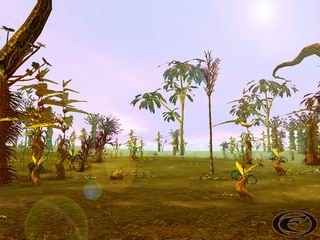 by Flemming Funch by Flemming Funch
From the homepage of Edward Castronova, Associate Professor of Telecommunications at Indiana University, via Bala Pillai:I specialize in the study of synthetic worlds: massively multi-user spaces on the internet. People in these worlds create virtual items to use there – magic wands and whatnot – and they’ve begun buying and selling them on eBay. eBay’s category 1654, 'Internet Games' includes most of the non-Asian trade in virtual items and currency, and as you can see, this is a very active market. (If you are not familiar with virtual item trading, please see this introduction.)
Based on these auction data, I've been able to estimate that the global online sales volume in virtual items is at least $100 million annually and quite probably much more. This external, internet-based trade volume seems to be only about 1/20th of the trade volume within the worlds, meaning that the in-world trade probably amounts to more than $2 billion annually. At that level, it is comparable to economic activity in many small regions, provinces, and even a few countries. Synthetic worlds have even been colonized, effectively, by independent companies, that do nothing but farm items and gold pieces for sale to third parties. At least one such company is known to maintain a low-wage workshop in Hong Kong, to manage a high volume of sales and deliveries of farmed items.
The videogame companies that operate the most popular synthetic worlds – some of which have millions of users – are currently deliberating how to respond: should they try to capitalize on this money flow, or shut it down? If they encourage virtual item trading in real currencies, if only to take a slice off the top, their virtual economies will merge into the real-world economy, with real-world taxation, regulation, and legal obligation being an unavoidable consequence. If they shut down the eBay trade (which, after all, is against the rules of these places as games), they close off a revenue source as well as a part of the game that many users think is great fun.
The lesson for serious people outside the videogame industry is this: like it or not, real life is genuinely and observably migrating online for many millions of people, in its personal, social, economic, and even political aspects. In the new frontier, the features of the real body or the ability to do real-world work are no longer important. What matters is that you can get along with others while doing quite fantastical, quite fun things – slaying dragons, casting spells, performing resurrections, building castles. New frontier, new rules.
At this point we do not know how many people will eventually find a fantastical society preferable to our own. It could be hundreds of millions. If so, we are in for some fairly dramatic changes in society, economy, and politics over the next few generations. Dramatic indeed. Particularly as the technology advances and a virtual reality eventually, before too long, will be as real as the physical reality. I.e. with all the senses involved. The holodeck kind of thing is likely to happen within the next 20 years, and probably sooner, so it will be entirely possible to move large chunks of our lives into virtual realities. And as the activity becomes economic, it increasingly won't just be something to do for recreation. It will be places to work and study, in addition to being places to play and meet people. And, no, it isn't just a bad thing, of people becoming addicted to illusionary realities, without dealing with the real world. The virtual spaces will increasingly become the real world too. And the nice part is that virtual resources are basically unlimited, so it might be a driver for economic abundance, no longer hindered by limited physical resources.
|
|
 by Flemming Funch
by Flemming Funch